
|
March 2, 2012 - No. 28 British Columbia Unacceptable Assault on Teachers' Rights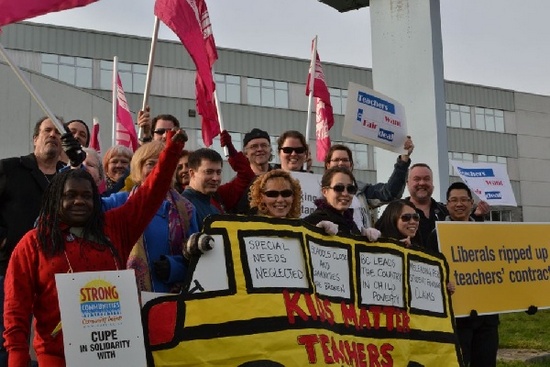 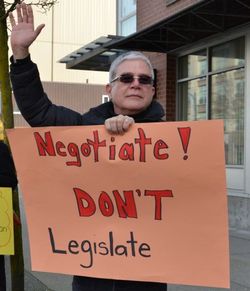 Rallies for BC Teachers Day of Action in Burnaby (left) and Vancouver, February 27, 2012. (CUPE, Media Coop) Defend
the
Rights
of
Teachers
and
Public Education Defend the Rights of Teachers and Public Education Unacceptable Assault on Teachers' RightsThe British Columbia Teachers' Federation (BCTF) announced in a March 1 press conference that a three-day teachers' strike will begin Monday, March 5. This is the initial limit of the strike imposed by the BC Labour Relations Board. Following the three-day strike the teachers are allowed under the BC Labour Board to strike one day a week thereafter. However, the BC government has tabled legislation virtually outlawing any teacher job actions in defence of their rights and public education and to force the government to bargain in good faith.
"A total of 27,946 teachers voted yes in a province-wide vote conducted February 28 and 29, 2012. In all, 32,209 teachers cast ballots, of whom 87% voted yes." "Teachers are determined and united in their opposition to Bill 22 and to the bullying tactics of a provincial government that has deliberately underfunded public education for a decade," said Susan Lambert, president of the BCTF. "The results of our province-wide vote are strong evidence of the unity and determination of BCTF members in rejecting this government's provocative and damaging legislation," Lambert added. The press release points out that Bill 22, tabled on
February 28 in the Legislature, "seeks to impose a net-zero contract,
to restrict the ability to negotiate improved learning conditions, and
to eliminate fundamental civil and labour rights for teachers."  Teachers and supporters rally at provincial legislature in Victoria, February 27, 2012. (CAW Local 114) Teachers' Rights Trampled! It Must Not Pass!Within hours of the British Columbia Labour Relations Board (BCLRB) February 28 ruling that teachers could escalate from limited job action (no administrative work, supervision or report cards) to full withdrawal of services, the BC Liberal party in power introduced Bill 22, the Education Improvement Act which will make ANY job action illegal. Further, Bill 22 takes job action out of the BCLRB's jurisdiction and puts it into the courts, and directs that the court may impose further punishment and "order the offender to pay compensation or make restitution to a person specified by the court for the actual loss or damage caused by or arising out of the commission of the offense." The "punishment" is in addition to the $475 per day for individuals to $1.3 million per day for BCTF for anyone who directs, authorizes or makes a declaration for any employee to go on strike.
Its ruling is an attack on the BC teachers' right to wage an effective fight for public education and wages commensurate with a Canadian-standard, yet it is more likely to be within the bounds of Supreme Court decisions on what is Constitutional vis-à-vis collective bargaining as a right than is Bill 22. The BCLRB ruled teachers can stay off the job for three days one week and one day for each of the next two weeks, after providing two days notice. Teachers cannot picket or "in any way"restrict access to schools or school districts, and BCLRB is to review the ruling on March 12. Bill 22 is completely self-serving. It legislates the demands of the government's bargaining arm the BC Public School Employers' Association (BCPSEA). Instead of appointing a mediator through the BCLRB, as requested by the BC Teachers' Federation (BCTF), Bill 22 directs a mediator be appointed by the Minister of Education. The legislation extends the current collective agreement to when a collective agreement is concluded or when the cooling-off period, ends August 31.
This must be considered a new era of collective bargaining where the Employer (government) appoints the mediator and puts in place terms of reference that are, in effect, the employers' demands. For example: The contract term is July 1, 2011 to June 30, 2013. There can be no new costs, in other words, net zero. All the "professional growth and mentorship," "Post & Fill, Employee Assignment and Transfer" and "Layoff and Recall" demands of BCPSEA are included in the "terms of reference." Section 6(2)(c) states: "the new collective agreement is to enable high-quality teaching and learning through i) effective feedback and evaluation of teachers to promote improvement, ii) alignment of professional development with teaching needs, and (iii) scheduling and selection of teachers suited to student needs." Bill 22 seeks to eliminate the BCTF as a professional organization capable of defending its members and as an effective force for defending public education. The legislation prohibits a teachers' collective agreement from containing any provisions regulating teachers, "the courses of study, the program of studies or the professional methods and techniques employed by a teacher"; it cannot limit "a board's power to employ persons other than teachers to assist teachers in the carrying out of their responsibilities under this Act." There can be no language around class size and/or composition.
Bill 22 seeks to appease the 82 per cent of British Columbians calling for a mediated end to the job action by inserting the role of a government appointed mediator who is limited to the terms of reference which deny any possibility of increasing funding for teachers' salaries or improving the class room situation for the students. The call is for an independent mediator, not a Minister of Education self-interested appointment under terms that are a straightforward dictate of government demands. Bill 22 is further confirmation that the social contract between unions and employers has been shredded. Clearly, denying even the power of to put up a picket line, the government wants to create conditions to liquidate the teachers' capacity to organize and fight for their collective rights with some effect. Bill 22 must not pass! It legislates teachers as criminals if they dare to stand up for maintaining their real standard of living or for increased funding to ensure quality public education as a right for all children and youth in BC. Exercising a legal right to strike must not be criminalized!
Teachers Shocked by Bill 22,
|
 Sign during protest of BC Liberals' 2005 back-to-work legislation against teachers. (E. Wayne) |
The BCTF says that the innumerable meetings between itself and the BC Public School Employers' Association (BCPSEA) cannot be called "collective bargaining." The BCPSEA has refused to yield a single inch to the BCTF's just demands to increase funding for elementary and secondary education and raise teachers' salaries at least to match the cost of living. The ruling Party's dogma of "net zero" is the only phrase that falls from the employers' mouths. Merely showing up at a "negotiating meeting" hardly meets the constitutional test for "bargaining in good faith."
Abbot's comments were the same before the Hughes inquiry as after. In September, the government met the teachers' partial strike action with an appeal to the Labour Relations Board to illegalize it because, as asserted for a decade, any action by the teachers to back up their demands is an attack on the students' best interests and the government's prerogative. However, people more and more find the government's die-hard refusal to fund public education properly, provide teachers with a modest salary increase and deal concretely with the problems of class size and special needs are an attack on the learning conditions of students and a plot to privatize public education even further.
In order to fulfill the government's mission to force a contract on the teachers and liquidate their public campaign for increased education financing, Deputy Minister Hughes presents a revealing if inadvertent conclusion in his report: "It is my assessment that unfortunately it is very unlikely that BCPSEA and BCTF will be able to reach a voluntary settlement.... I ... find that the 'net zero' mandate and the outstanding 'split of issues' between provincial and local bargaining are fundamental obstacles to the parties being able to reach a voluntary settlement."
Hughes dodges the obvious conclusion: the government's dogmatic and irrational effort to impose a "net zero" wage settlement in light of annual cost of living inflation of around 2.5 per cent, years of zero wage increases for teachers in recent years and refusal to deal separately with issues at the local level is the major cause of the impasse.
After reading the Liberal deputy-minister's report, Abbot asserts that a chasm remains between the parties despite nearly 80 bargaining sessions over the past year. "When adults can't reach a respectful agreement on these things," he said, "it is always the students who pay the price." Brilliant! The Liberals start and end "nearly 80 bargaining sessions" saying they refuse to find a penny for teacher salaries or increase funding for reduced class sizes etc. They blame the teachers for making "students pay the price" and then order teachers to end their job action. Based on this sophism the Liberals again want to criminalize teachers' right to strike as they have done before. No wonder a majority of public opinion supports the teachers despite a misinforming and anti-teacher mass media.
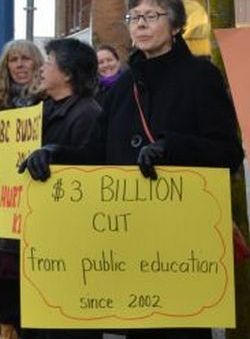 Day of Action, February 27, 2012 (Media Coop) |
Students' well-being is not Abbot's driving concern. The government he represents has cut real dollar spending to education. This has been shown concretely in study after study showing education spending is now a declining percentage of the provincial Gross Domestic Product (GDP) and in relation to population growth, inflation and other factors. Cost downloading onto school boards has been another contentious issue, for example, school boards being forced to divert funds to pay for school buses. Since 2001, over 200 schools have closed, in many cases piling on misery in districts suffering economic problems and other issues. Other school districts such as Surrey complain continually of overcrowding. Speech-language and occupation therapists, teacher psychologists, behaviour assessment and teaching assistant services, to name a few, have been pared so thin there are long waitlists for services. This has become a significant factor driving parents, even with modest incomes, to pay extra fees to transfer their children from a public to a private school. Taken together, the government could be accused of privatizing and wrecking the public education system.
The BCTF is supposed to be in collective bargaining with the employer. Collective bargaining, the Supreme Court of Canada has ruled, is a constitutionally guaranteed right. The right is to the act of bargaining, not to obtaining necessarily what is wanted. But this must apply to both sides.
However, the BC government has dictated the BCPSEA must receive everything it wants while the teachers must receive nothing. "Net zero" bargaining starts the process with an inevitable conclusion: not a penny more in salaries or anything else. How is that "bargaining in good faith"? How can the BC government simply proclaim it does not have a penny more for teachers, especially given the same government has cut corporate income tax from 16.5 per cent to 10 per cent?
***
Quotes from a recent item on BC's lost government revenue, "The Era of Tax Cut Stupidity that Starved BC" by Will McMartin published February 27 in The Tyee "details how the BC Liberals squandered a historic chance to strengthen this province." McMartin has been a political consultant affiliated with the Conservative, Social Credit and BC Reform parties.
- "Falcon's budget shows that corporate profits will surpass $24.7 billion in 2012, yet Victoria's corporate-income tax receipts will come in at less than $2.3 billion -- or a mere 9.1 per cent of profits."
- "Next year, in 2013, profits are expected to rise to $25.8 billion, but the province's take will drop to 7.9 per cent."
- "Today, the receipts generated by Victoria's Consolidated Revenue Fund (CRF) -- BC's main financial account -- have sunk to a level not seen since the late 1960s/early 1970s."
- "And under the broader Generally Accepted Accounting Practice (GAAP) measurement, provincial revenues over the last decade have been in a near-constant decline, year after year."
- "Today, CRF receipts -- as outlined in Falcon's 2012/13 budget -- are down to slightly more than 15 per cent of nominal GDP, a level not seen since W.A.C. Bennett left politics 40 years ago."
- "In fiscal 2000/01, the year prior to the BC Liberals' taking power, GAAP receipts stood at 22.6 per cent of BC's nominal GDP."
- "Now, in the coming fiscal year -- as shown in the Budget and Fiscal Plan, 2012/13 - 2014/15, released by Falcon on Tuesday -- the comparable figure is expected to fall to just 19.6 per cent of GDP."
- "The revenue lost to the provincial treasury -- three per cent of nominal gross domestic product (22.6 per cent minus 19.6 per cent) -- in 2012/13 alone is $6.6 billion."
- "By 2014/15, when Falcon expects GAAP receipts to drop to 19.2 per cent of GDP, the annual loss will be $8.1 billion."
***
The government can hardly claim a "lack of funds" when it threw those funds away while nickel and diming the people to death with user fees, sales taxes such as the HST and other regressive taxes. It is the dictate of the government for "net zero" that has put bargaining at an impasse, not the BCTF demands for modest salary increases to match the cost of living and catch up past "net zero" lowering of their real income.
Another matter that Hughes claims makes it "unlikely" for a negotiated settlement is "the outstanding 'split of issues' between provincial and local bargaining." The Public Education Labour Relations Act (PELRA) established provincial bargaining in 1997. Upon enactment, PELRA required the parties to negotiate the designation of provincial and local matters, which were defined as not having "costs." All cost items are at the provincial table. This designation is recorded in a Letter of Understanding (LOU), which has not changed since the mid-'90s.
At the outset of the current round of bargaining, BCTF stated its intention to negotiate only compensation items (salary, benefits, paid leaves, and hours of work -- the "PELRA 4") at the provincial table and to negotiate all other items locally. BCPSEA simply refuses to do this, thereby violating the spirit of both the legislation and the LOU.
BCTF argues that matters of class size and composition are currently being discussed elsewhere because the Supreme Court declared Bill 28 (2002) unconstitutional. For the government to be in conformity with the Court decision, it must introduce new legislation before April 2013. The government refuses to deal with this seriously and separately with speed. Nor will it deal with any local issues except at one province-wide table where it presents a position and simply refuses to budge from its entrenched views. In short, the Liberal government has defined "collective bargaining" as "buckle under to what we dictate or be legislated back to work" with a contract we dictate under our net-zero and other mantras to destroy public education.
Although this round of the struggle unfolding between the government and BC teachers is far from over, what remains clear is this: when the forces upholding quality public education and the rights of workers stand as one, real headway can be made. Teachers, parents, students and the broad mass of the working class must ensure quality public education is provided as a right and the rights of teachers are guaranteed. The government assault on teachers' rights and public education is an attack on public right and society itself. Workers across the province must stand as one to hold the government to account to stop attacking the rights of teachers, stop paying the rich and increase funding for social programs such as public education. The Clark government's dictate of "net zero" and the criminalizing of teachers must be vigorously opposed.
Budget Speech 2012
Mantra for an Anti-Social "New Paradigm"
Finance Minister Kevin Falcon delivered British Columbia's Budget Speech 2012, in advance of presenting BC's "three year budget and fiscal plan."
Falcon's Budget Speech highlighted whose concerns the budget and fiscal plan will address saying, "Investors are nervous. Consumers are cautious. The days of markets tolerating government overspending are finished. That's the new paradigm."
 BC budget denounced during teachers' Day of Action, February 27, 2012. (Media Coop) |
The BC government's "new paradigm" is to govern on behalf of "nervous investors, cautious consumers and intolerant markets." What happened to the concept of government governing on behalf of the people? What happened to representing the polity, the members of society within the established borders of a territory -- the youth, seniors, workers from all sectors of the economy, First Nations and others who are the public? Since when did narrow economic categories such as investors and markets, which mostly manipulate public interests for private gain, become the primary consideration of governments? The Falcon/Clark regime declares that neoliberal investors and markets rule and their demands, needs and rights trump those of the people. But the voice of the people says No! to the "new paradigm." This No! is evident in the struggle of the teachers in defence of their rights and public education, and the widespread support they have received.
The public has a right to a government that upholds its well-being and the general interests of society and guarantees a Canadian standard of living from birth through retirement until passing away. Falcon's "new paradigm" eliminates the public and society from its basic consideration so that it can serve the narrow economic categories of "investors, consumers and markets." With the public eliminated from the "new paradigm," public assets such as school board property and the Liquor Distribution Branch, and social programs and services are under assault to be eliminated along with the dignity and rights of the public sectors workers who deliver those programs and services. The "new paradigm" of narrow economic categories and its language of "net zero," "eliminating the deficit" and "fiscal discipline" negate the language of the people upholding public services, social programs, public education, workers' rights, hereditary rights of First Nations etc.
Under the spell of his anti-social "new paradigm" Falcon says, "[Fiscal discipline] instills confidence and reinforces the growing awareness of British Columbia and Canada as a safe harbour for investment and investors. And so, fiscal discipline is at the very core of Budget 2012."
Falcon's BC "safe harbour for investment and investors" is one of unrelenting attacks on social programs, public services, teachers and other public sector workers, the well-being of the people and society itself. Falcon's Budget 2012 speaks not about the people and their rights and needs nor even of the economic crisis that needs a new direction but of "Balancing the budget," "Holding the line on spending," "Eliminating the deficit," "Building a more competitive economy," "Ensuring a positive climate for job creation, growth and investment" and "Eliminating unnecessary regulation."
Not once is the modern reality of BC considered where people are born to society and are dependent upon that society to provide livelihoods, meet the people's needs and recognize their rights. BC human beings have claims on the society and any modern government worthy of the name has the primary obligation to ensure those claims are met to the level society has developed. Those claims cannot be met unless recognized and a plan elaborated to meet them, which the Falcon and Clark government outright refuse to do with their neoliberal "new paradigm" of "investors, consumers and markets."
Falcon's Budget Speech asserts a priority to "Eliminate the deficit." Where did this priority originate? It certainly did not come from the polity who Falcon is supposed to represent. Starting from this assertion to "Eliminate the deficit" as a grand priority, Falcon starts tossing out numbers to overwhelm the listeners and make them bow down in confusion and obedience. He says the government will eliminate the deficit by 2013-14, which will solve all BC's problems and give rise to a $250 million surplus in 2014-2015. Within this formidable victory, where the socialized economy and social problems are simply ignored, Falcon says the provincial debt of $57.60 billion will increase $5.10 billion in 2013-14 and a further $3.7 billion in 2014-15 to $66.4 billion. By "Eliminating the deficit" as the grand priority, magic will be performed because an $8.8 billion debt increase will result not only from a balanced budget but one with a surplus!
Falcon's "new paradigm" of nonsensical numbers is a ruse to fool the gullible and serve his constituency, the financial oligarchy. The Falcon/Clark regime serves up the public to private interests. The people and their concerns about the economy, the environment, health care, education, the needed social services and programs, their well-being and the rights of First Nations are not at the centre of Budget 2012. The people's concerns are not even considered. Instead, the "very core of Budget 2012" is the "new paradigm" of "fiscal discipline," "investors and markets."
An anti-social wrecking provincial budget deserves nothing but contempt. It should serve to awaken the people to turn the situation around in their favour, to empower them as the centre of any government's "paradigm." Only with the well-being of the people and the general interests of society as primary considerations of a budget and plan for the future can problems be solved, a new human-centred direction for the economy elaborated and developed, and a society built fit for human beings.
Read The Marxist-Leninist
Daily
Website: www.cpcml.ca
Email: editor@cpcml.ca
 A BCTF Press Release dated
February 29 says that members
of the BCTF "voted overwhelmingly to resist the unjust actions of the
provincial government in yet again moving to impose a contract on the
province's 41,000 public school teachers.
A BCTF Press Release dated
February 29 says that members
of the BCTF "voted overwhelmingly to resist the unjust actions of the
provincial government in yet again moving to impose a contract on the
province's 41,000 public school teachers.
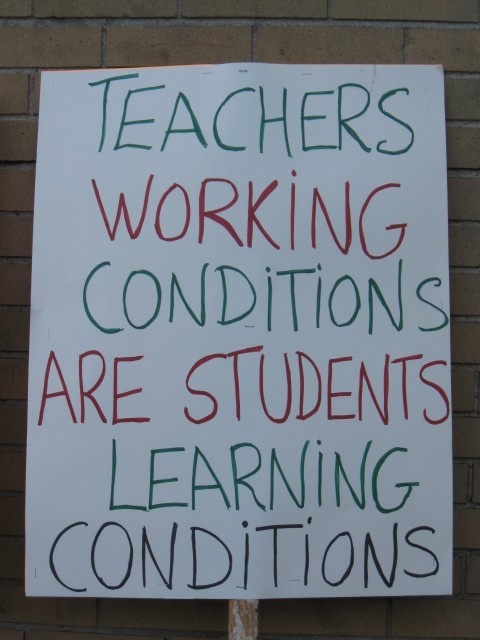 Clearly, the BCLRB must
change its ruling after Bill 22
passes.
Clearly, the BCLRB must
change its ruling after Bill 22
passes.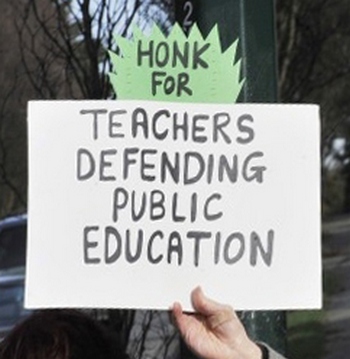 Bill 22 states collective
bargaining must commence
within 72 hours of Bill 22 coming into force.
Bill 22 states collective
bargaining must commence
within 72 hours of Bill 22 coming into force. The legislation is
self-serving. It serves the private
interests seeking to widen the market for private for-profit education
and is against the public interest. This legislation is another example
of the state using its powers to further attack a crucial social
program and acting against the public good. The insistence
of the government to impose a "net zero" contract on teachers and
public civil
servants is the dictate of the financial oligarchy to cut their share
paid to the state in taxes, while shrinking the capacity of the
teachers and other public servants to purchase the goods and services
within the economy. It's pay-the-rich politics.
The legislation is
self-serving. It serves the private
interests seeking to widen the market for private for-profit education
and is against the public interest. This legislation is another example
of the state using its powers to further attack a crucial social
program and acting against the public good. The insistence
of the government to impose a "net zero" contract on teachers and
public civil
servants is the dictate of the financial oligarchy to cut their share
paid to the state in taxes, while shrinking the capacity of the
teachers and other public servants to purchase the goods and services
within the economy. It's pay-the-rich politics. The legislation introduced
this afternoon by Education Minister George Abbott constitutes yet
another assault on the profession of teaching and the public education
system by this provincial government.
The legislation introduced
this afternoon by Education Minister George Abbott constitutes yet
another assault on the profession of teaching and the public education
system by this provincial government. The aspect of the
legislation that is most damaging for students prohibits teachers from
bargaining class size, average class size, staffing levels, ratios or
caseloads for another two years. Thus, there are no effective limits on
the number of children who can be assigned to any class over Grade 3 or
on the diversity
and complexity of needs represented within any class.
The aspect of the
legislation that is most damaging for students prohibits teachers from
bargaining class size, average class size, staffing levels, ratios or
caseloads for another two years. Thus, there are no effective limits on
the number of children who can be assigned to any class over Grade 3 or
on the diversity
and complexity of needs represented within any class. Significantly, the BC
Teachers' Federation requested a
mediator to help resolve negotiations, which was rejected by the
government.
Significantly, the BC
Teachers' Federation requested a
mediator to help resolve negotiations, which was rejected by the
government. Again, the BCTF suggested
arbitration would be better
than a legislated contract. However, the government refused that as
well.
Again, the BCTF suggested
arbitration would be better
than a legislated contract. However, the government refused that as
well. But when the question
included, "a wage freeze, weakened
seniority provisions and other concessions," opposition increased to 62
per cent and support dropped to 34 per cent.
But when the question
included, "a wage freeze, weakened
seniority provisions and other concessions," opposition increased to 62
per cent and support dropped to 34 per cent.
